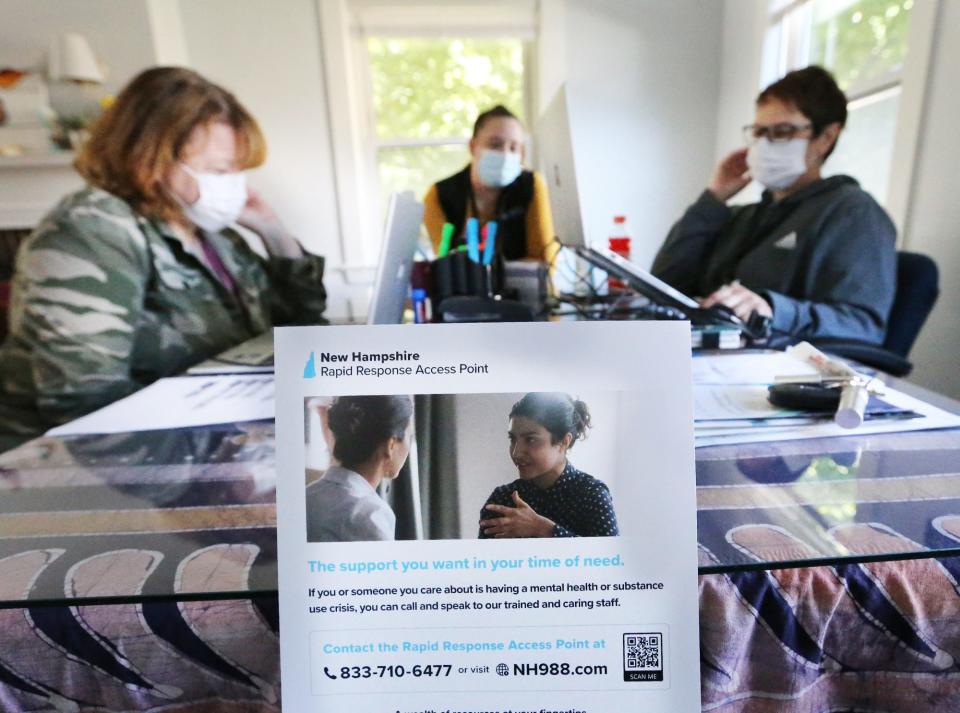'The kids are not OK’: How to support adolescents' mental health
As a parent, John Broderick, a former chief justice of the New Hampshire Supreme Court, failed to recognize his son’s mental illness, with devastating consequences for his family.
For six years, Broderick has traveled to middle schools and high schools sharing his story, urging listeners not to make the mistakes he made, to recognize the signs of mental illness and to encourage young people to seek treatment.
After speaking to more than 100,000 students, with thousands of them confiding in him about their most personal fears around mental health, Broderick has realized the audience most in need of his message are parents, guardians and other adults responsible for supporting the mental health of children, adolescents and young adults.
This is the fifth story in a year-long collaboration on mental health between Seacoast Media Group, New Hampshire Union Leader and Dartmouth Health, inspired by the work of John Broderick.
“I want to share with parents what sons and daughters just like theirs have shared with me all across New England,” said Broderick, who in August published a book “Backroads and Highways: My Journey to Discovery on Mental Health.”
What do Broderick and mental health professionals want parents to know about their children?
“The kids are not OK,” said Jeffrey Levin, a psychotherapist, social worker and life coach who has been working with children and young adults for 42 years. “Kids writ large are not OK. Some are doing better than others, but the kids are really struggling.”
Susan Stearns, executive director of NAMI-NH, said COVID intensified a youth mental health crisis that existed before the pandemic outbreak in March 2020.
“We hear from parents, caregivers, educators, coaches, everyone who is interfacing with children and youth about their concerns,” Stearns said.
In August, Gov. Chris Sununu signed a law mandating that all student IDs for sixth-graders through 12th grade must include the suicide prevention lifeline number 988.
Gracelynn Hewey, a 17-year-old junior at Winnacunnet High School in Hampton, describes herself as a social butterfly who had her wings clipped by the COVID-19 pandemic.
"I didn't leave my house for two years almost," she said. "I was constantly home. Just being in your room alone for so long is severely depressing."
As pandemic restrictions lifted, Hewey cleaned out her room, bought new clothes she would never have worn before the pandemic ("I started changing my aesthetic"), began working two jobs, has returned to school and she's doing her best to adjust to life in person rather than online.
"I literally had to kind of force myself to start communicating with other kids," she said.
'Don't stop asking for help': What NH youth are saying about mental health crisis
What causes anxiety and depression in adolescence?
Levin recently introduced The Reconnection Project, a program to reduce stress and anxiety in school communities, to students, parents and teachers at Winnacunnet High School. Levin said young people he works with are disconnected from parents and other adults in their communities and suffering from what he calls “outcome fever.”
“Outcome fever is this vague sense that nothing I do is enough,” Levin said. It’s a phenomenon he’s seen from elementary schools to the Division I college athletes he mentors; the feeling that a single mistake can have devastating consequences. “Outcome fever is a low-grade constant sense in the back of my mind that I can’t screw up, and it’s real, I assure you.”
Broderick relates the story of an eighth-grade girl who told him: “I’ll tell you why we’re stressed. We’re always trying to accomplish the next thing, so we’ll be eligible for the thing after that.”
Both Broderick and Levin believe we are putting too much pressure on kids to achieve in academics, athletics and other endeavors. Children and adolescents aren’t given unscheduled time to think and play independently, to make mistakes and learn from them.
“There are a lot of causes for mental health problems,” Broderick said. “Some are related to DNA or a chemical imbalance, some of them are due to adverse childhood experiences or post-traumatic stress. I’m well aware of all that. But I don’t think what I see is caused by that. What I see are kids who are ready to pop.”
Do we need to act? 'So many depending on us': John Broderick urges action on mental illness
Dr. Steven Schlozman, a psychiatrist affiliated with Dartmouth Health, said he “agrees 100%” with Broderick and Levin’s assessments.

“I’m not going out on a limb to say the pressures are orders of magnitude higher than they were even as recently as a decade and a half ago,” Schlozman said.
What specifically are kids so anxious about?
“The Earth itself is at risk, which is very much on kids' minds, like all kids,” Schlozman said.
Superintendent Meredith Nadeau, who oversees Winnacunnet and other schools in SAU 21, said students are on edge over repeated school shootings.
“How tragic that students in this country feel fearful of going to school because they’re afraid they might get shot,” Nadeau said.
Other factors cited by those working with youth include social media-induced fear of missing out and false expectations of body image and life success, testing pressures, fear of disappointing parents.
Another contributing factor, says Lynn Lyons, a therapist and author in Concord, New Hampshire, is that parents themselves are struggling.
“I don’t think you can look at what’s happening to kids without looking at the people who have created the systems that they’re in,” Lyons said. “Parents themselves are really stressed out.”
Social media changes the connection points: Teens tell their truth about social media and mental health. 'I always have my phone.'
Normal adolescent angst versus mental illness
The challenge facing adults supporting young people's mental health is distinguishing between normal rebellious adolescent behavior and what could be a more serious mental health issue.
“It’s a much grayer line than anyone would like it to be,” Dr. Schlozman said. “It’s not like pneumonia where you can’t get your breath and it’s obvious you need to get a chest X-ray. This is much harder to interpret and needs to be assessed on a kid-by-kid basis.”
Jodie Lubarsky, who oversees youth and family services at Seacoast Mental Health Center, offered this advice.
“I always say to guardians, parents and caregivers, you know your child best,” so you’ll be the first to recognize if their baseline behaviors appear to have changed, Lubarsky said.
Talley Westerberg, Winnacunnet’s social worker for the past 22 years, also believes adults “need to trust their gut about the mental health of the children in their life. I think they have to ask the teenagers how they’re really doing, and then give them the space to answer.”
Because adolescents are social by nature, an increase in self-isolation could be a red flag, experts interviewed for this story said.
A decrease in self-care and hygiene, changes in eating and sleeping habits, use of drugs or alcohol, extreme irritability or mood swings, sudden anger or unexplained euphoria, a decline in academics or run-ins with the law can all be warning signs.
When any of these patterns shift to a place where they are interfering with your student's ability to function in their daily lives, it is time to reach out for help, Westerberg said.
Any specific or implied references to suicide should be treated as a call to action. The most direct route to crisis care in New Hampshire is to call 1-833-710-6477, a mental health hotline staffed 24/7. You can also visit nh988.com or call the 988 suicide hotline.
If you worry your child might be having suicidal thoughts, have a direct conversation with them about it, experts said.
“All the data indicates having those conversations with your kids truly can be life-saving,” said Stearns of NAMI-NH.
How to have hard conversations with adolescents
If you think a child is struggling with their mental health, you need to speak with them, experts said, but that can be easier said than done.
“Adolescence is a time where you start busting away and in order to do that you’ve got to think you know better,” said Dr. Schlozman of Dartmouth Health. Culturally and biologically, adolescents need to assert their independence, even though deep down they know there are still things they need from their parents and other adults.
“It’s the kind of thing where the eyes get rolled, but the message is still heard,” Schlozman said.

Lyons, the therapist, describes, “this sort of interesting dance that adolescents do where they want you to come to them so that they can tell you that they don’t need you.”
The most important thing is for adults to be fully present when a child is finally ready to speak.
“What’s really important for us to remember as adults is once they determine they want to reach out to us and approach us, that we make sure we’re ready to listen,” said Lubarsky, of Seacoast Mental Health.
That means putting down your phone, turning off the television or other distractions, and “just stay in that place of listening and wait until they tell us what they need from us.”
An adolescent may start a conversation with you, get spooked and break it off before fully expressing what it is they want you to know. That’s OK, too. Just make sure they know that when they’re ready to continue the conversation you are ready to listen, Lubarsky said.
Gracelynn Hewey, the Winnacunnet junior, urges parents to be calm.
"If (your child) is stressing and their anxiety is through the roof already, yelling at them is just going to make it worse," she said. "Yelling is only going to make the fire bigger, and you don't want the fire to continue. You want it to stop."

All experts said teens need empathetic listening, not unsolicited advice or efforts to minimize what’s bothering them. Lyons called it “awkward empathy.”
“It’s OK for you not to have a perfect conversation with your child,” Lyons said. “It’s OK for you to stumble through a conversation, to not have the exact right words and even to say, ‘I don’t know exactly what to say right now, but I see that you’re struggling, is there anything I can do to help or do you just want me to listen for a while.’”
Lyons warns against introducing blame into conversations.
"Blame is so caustic and corrosive and so prevalent right now, and it really gets in the way of helping our kids," Lyons said. "One thing parents can do in a very concrete way is to work on being less reactive in the moment. When a family decides they're going to work on that together, sometimes it can really make a big difference."
Handle conversations about romantic breakups with care
All experts noted that a romantic break-up is a particularly intense moment for adolescents and young adults. Conversations about them need to be handled with care.
“Outside of a biological vulnerability to a psychiatric syndrome, the single biggest thing that can tip kids over is a romantic breakup,” Dr. Schlozman said, explaining the bad feeling can be so intense that it overwhelms the ability of the adolescent brain to engage in contemplative thinking.

Instead, the young person feels that their entire identity has been rejected, that they are unlovable and will never be loved again.
“Just agree with them that it hurts,” Schlozman said. “If you have a personal story (of a breakup) you’re comfortable telling as a parent you’d be surprised how many kids want to hear that.”
I think my child has a mental health issue: What do I do now?
If you suspect a child may have a mental health problem, don’t try to handle it alone, experts said. Reach out for help either from health care providers, the school, your faith community, family or friends.
Lubarsky, at Seacoast Mental Health, suggested a good place to start is a child’s pediatrician, many of whom also have behavioral health integrated into their practices.
“Oftentimes pediatricians have had a lifelong relationship with the child,” Lubarsky said. “They know that child from a medical perspective. Knowing that child and family, they might be able to make a really targeted suggestion, like, you know, knowing your son the way I do I would recommend calling this provider.”

Westerberg, Winnacunnet’s social worker, said pediatricians are a good place to start because “it’s important to rule out any medical concerns, especially if it’s a new mental health concern they’re seeing in their child. Pediatricians have that longer term perspective on a child’s health and can be a really validating sounding board for the changes that parents are seeing.”
If a family doesn’t have a long-standing relationship with a pediatrician, they can reach out to one of the state’s 10 community mental health centers, which provide care regardless of ability to pay and accept most insurance.
In January, the state launched mobile crisis response teams at all 10 of its community health centers.
Mobile crisis teams include a clinician, social worker and peer counselor, and deploy to people’s homes, schools, hospitals, wherever they are needed. The goal is to bring care to the patient rather than forcing someone in crisis to sit for hours in an overburdened emergency department which may not be able to do anything more than hold them until a bed opens in a behavioral health unit or hospital.

You can reach the rapid response teams and other emergency mental health services 24/7 by calling the new 988 suicide hotline number or 1-833-710-6477. You can also reach out via nh988.com. A representative from Beacon Health Options answers those lines and conducts an initial screening. Some crises are handled through phone referrals while others lead to a mobile crisis team dispatch.
On Sept. 8, at a suicide awareness prevention press conference, a young man who identified himself as Joshua-Christopher, spoke in glowing terms of his experience reaching out for help via nh988.com.
“I found the whole process, from the very first chat on the NH 988 website to the discharge from the hospital to be the smoothest I've ever had while being in crisis,” Joshua-Christopher said. “I felt like I had more of a say in the decisions being made about my care. I appreciated being asked for consent before having people come to my house. I would like to encourage anyone who's struggling to please reach out for help. You are worth help. You are worth getting better. You deserve a life worth living.”

According to Dennis Walker, who runs the mobile unit out of Seacoast Mental Health, there have been roughly 16,000 calls to the state hotline since January, which have resulted in more than 4,000 mobile deployments. Of those deployments, 18% involved children and adolescents, either at home or at school.
Walker said if a person talks about harming themselves or others or is acting destructively, they will always deploy.
“You should call if you think you are in a crisis,” Walker said.
Does New Hampshire have space to help teens in need?
Lubarsky said Seacoast Mental Health currently is adequately staffed to provide services to anyone in need. That is not the case across the state and the shortage of care is most acute for those needing inpatient behavioral services.
The state continues to lack inpatient beds for children, said Stearns of NAMI-NH. On Friday, Sept. 16, all 16 Hampstead Hospital beds available for youth were filled and 22 children were “boarding” at local hospital emergency departments waiting for admission. In some cases, the wait can be weeks.
“Our mental health system has been stretched to the breaking point,” Stearns said.
Westerberg, the Winnacunnet social worker, states it more emphatically: “We should all be shouting from the rooftops about the experiences of our kids that are in a true mental health crisis and awaiting an inpatient psychiatric bed.”
Schools are also an important mental health resource, able to provide “doses of safety,” Westerberg and other experts said.
“School counselors and school social workers can help with referrals to community providers and can be a safe ear in school when academic or social pressure gets to be too much,” Westerberg said.
Nadeau, the SAU 21 superintendent, urges all students to seek support if they are feeling troubled.
“We have plans in place for people to gain access to supports right away,” Nadeau said. “We know people need access to them. I want to reiterate the message from Justice Broderick that seeking help is what strong people do. It helps them remain strong. It helps them grow and overcome some of the obstacles that they face and there are people who care about them and want to help and support them.”
Addressing a mental health crisis can be difficult and painful, but Stearns of NAMI-NH reminds that the crisis “is a detour, not a destination.”
“Treatment is not someone’s life,” Stearns said. “It’s what allows them to live their life.”
'Burnout is real': Student athletes' mental health is not a game
If you need help: Suicide hotline number
You can reach the rapid response teams and other emergency mental health services 24/7 by calling the new 988 suicide hotline number or 1-833-710-6477. You can also reach out via nh988.com.
A representative from Beacon Health Options answers those lines and conducts an initial screening. Some crises are handled through phone referrals while others lead to a mobile crisis team dispatch.
Read more of this series
This article originally appeared on Portsmouth Herald: How to support adolescents' mental health: What to do, what to avoid

